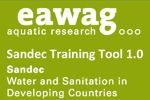Key Resources
Complementing Sites
 | Cap-Net is an international network for capacity building in IWRM. It is made up of a partnership of autonomous international, regional and national institutions and networks committed to capacity building in the water sector. The website provides a vast amount of training material on Integrated Water Resources Management, both available online and on CD. Complements the SSWM Toolbox with tutorials and learning materials on different aspects of Integrated Water Resources Management, River Basin Management etc.
|
|
| The WHO/UNICEF Joint Monitoring Programme (JMP) for Water Supply and Sanitation is the official United Nations mechanism tasked with monitoring progress towards the Millenium Development Goal (MDG) relating to drinking-water and sanitation (MDG 7, Target 7c), which is to: "Halve, by 2015, the proportion of people without sustainable access to safe drinking-water and basic sanitation". In fulfilling this mandate, the JMP publishes updated estimates every two years on the use of various types of drinking-water sources and sanitation facilities at the national, regional and global levels. Complements the SSWM Toolbox specifically with data on water supply and sanitation coverage and detailed statistics about the use of water and sanitation facilities at different scales.
|
 | The GWP IWRM Toolbox is an online collection of good practices for managing water resources at all levels. It is a free and open with a library of peer-reviewed case studies and references that can be used by anyone who is interested in implementing better approaches for the management of water or learning more about improving water management on a local, national, regional or global level. Complements the SSWM Toolbox specifically with knowledge on institutional and conceptual frameworks for IWRM (specifically for institutional stakeholders).
|
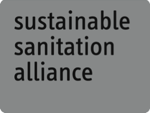 | The Sustainable Sanitation Alliance (SuSanA) is an informal network of organisations who share a common vision on sustainable sanitation. SuSanA works as a coordination and working platform and contributes to the policy dialogue on sustainable sanitation. SuSanA’s website provides various kinds of resources on sustainable sanitation including a library, case studies and news. You can also find them on facebook to get informed regularly on the newest discussions. Complementing the SSWM Toolbox by providing a networking platform for numerous organisations in the sanitation sector.
|
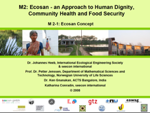 | This interactive curriculum on ecosan is meant primarily for university and college teachers and students, but also for NGOs, development organisations, or simply interested persons. This is on of the first comprehensive compilations of ecosan related material, structured into an curriculum. The development of the curriculum was undertaken by Johannes Heeb (seecon international gmbh), Prof. Dr. Petter D. Jenssen (Norwegian University of Life Sciences), Ken Gnanakan (ACTS) and Katharina Conradin (seecon international) and financed by the Swiss Development Cooperation (SDC). The Ecosan Curriculum was a predecessor for the SSWM Toolbox. It is no longer available as a CD, but can be downloaded from the SuSanA homepage (http://www.susana.org). Complementing the SSWM Toolbox with specific lectures on Ecological Sanitation (Ecosan).
|
|
| http://www.eawag.ch/forschung/sandec/training_tool/index_EN The Sandec Training Tool 1.0 contains seven elaborate modules for teaching and training on different topics of water and environmental sanitation in developing countries. Each module consists of a presentation, along with comprehensive lecture notes and key readings, suitable for at least 2 hours of teaching. Furthermore, the Training Tool also contains helpful exercises and case studies. Complementing the toolbox with a ready-made, comprehensive (and condensed) course on environmental sanitation and water technologies.
|
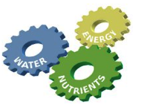 | http://www.sustainablesanitation.info/meny.html This Sourcebook and 600 animated power-point slides provide the trainer (researcher, teacher, instructor, etc.) with a science- and experience-based material that covers various aspects of sanitation. It gives a topic-based and integrated understanding of the available possibilities to provide comfortable sanitation arrangements that recirculate resources in hygienic, affordable and socially accepted ways. Examples abound of systems and arrangements from various parts of the world. The intention is that the trainer picks out slides and topics that he or she wants to use in training sessions. Complementing the toolbox with a comprehensive science- and experience-based course on environmental sanitation technologies.
|
 | http://www.partnershipsforwater.net/ Parthershipsforwater.net aims at reaching an effective water governance for all water users. The ten themes in this initiative provide a framework of ideas and ways of working that can contribute toward improved water partnerships, and hopefully effective water governance for all users. The site also contains a searchable library of best practices, exemplary case studies, and other tools published by various institutions. Aimed primarily at decision makers, it complements the SSWM Toolbox wish a short and concise overview over the ten most important themes in regard to partnerships in the water sector.
|
 | http://www.iucn.org/about/work/programmes/water/resources/toolkits/ The IUCN Water and Nature Initiative (WANI) has worked with 80+ partner organizations across the world to demonstrate water management that supports healthy rivers and communities. As part of this collaboration, a toolkit series was developed to support learning on how to mainstream an ecosystems approach in water resource management and to build on practical case studies to show how key principles of sustainable water management are implemented in river basins. The toolkit is aimed at practitioners, policy makers and students. Complements the SSWM Toolbox by providing short, but comprehensive publications on different aspects of environmental water management.
|
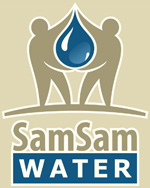 | SamSamWater Foundation was created by three hydrologists from the Netherlands in order to contribute to sustainable and reliable access to water and sanitation in developing countries. SamSamWater gives advice and participates in water and sanitation projects. Besides the project information and reports, their website also hosts a ‘tool’ were they make available the tools they have developed (e.g. the SamSamWater Climate Tool which uses various date to estimate precipitation and evaporation anywhere on Earth). Moreover, the website also contains a ‘library’ with practical information, data and (GIS) maps gathered from numerous sources, such as research institutes, companies, NGOs and government organisations. Complements the SSWM Toolbox by providing a library with documents useful mainly for hydrogeologists and useful open-source tools to assess hydrogeological conditions.
|
 | The Water Evaluation And Planning (WEAP) system is a user-friendly free software tool that takes an integrated approach to water resources planning. It WEAP is developed by the Stockholm Environment Institute's U.S. Center. It aims at incorporating management challenges, allocation of limited water resources between agricultural, municipal and environmental uses and the integration of supply, demand, water quality and ecological considerations. Complementing the SSWM tooblox by providing the possibility to develop an integrated water management plan for a given area at the local or national area.
|
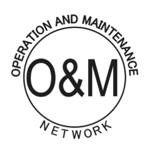 | http://www.operationandmaintenance.net TheOperation and Maintenance Network plays a leading role in promoting effective operation and maintenance; providing practical and authoritative advice to water and sanitation system managers and operators in low and middle-income countries. The Network offers access to practical guidance material via the online O&M toolbox, technical assistance from experts on O&M issues, the chance to share knowledge, case studies and develop new guidance materials, and provides access to regional events and workshops linked to wider capacity building activities. The network is open to all, but login is required. Complements the SSWM Toolbox with more in-depth knowledge on O&M and the possibility to access technical guidance.
|
Wikis and Discussion Forums
 | Akvopedia is an open water and sanitation resource that anyone can edit. The goal of Akvopedia is to improve water and sanitation projects through knowledge exchange on smart and affordable technical solutions and effective approaches. The site contains more than 1025 articles, which are divided into a water portal, a sanitation portal and an approaches portal. Large knowledge sharing platform which allows registered users to enter their own contents and edit contents of others.
|
 | GrassrootsWiki is a knowledge portal for the dissemination of ideas, experiences and instructions in the field of development cooperation and humanitarian assistance where anyone can contribute. It boosts the global dissemination of grassroots technologies on different subjects, including water, sanitation & hygiene, shelter & housing, nutrition & agriculture, energy, environmental protection and entrepreneurship – containing technology descriptions, case studies, as well as links to organisations. Complementing the toolbox with additional SSWM tools as well as areas outside the primary focus of water and sanitation, such as housing, nutrition, energy, or entrepreneurship. Allowing users to enter and edit their own content.
|
 | http://practicalaction.org/practicalanswers/ Practical Answers aims to provide a resource on small-scale technologies or intermediate technologies that can be used to improve the lives of people living in poverty. It allows people to access the wealth of technical information within Practical Action and well as bringing together the knowledge of others. Complements the SSWM Toolbox by providing answers, resources and information on other themes than water and sanitation.
|
 | WaterWiki, developed by UNDP, aims at connecting Water professionals to knowledge and experience based on work in the context of the UN, at providing an on-line collaboration platform for Water Sector Practitioners worldwide to find and share their experience and lessons learned and at improving coordination and inter-agency cooperation in the water sector. WaterWiki Partners include WHO, FAO, UNESCO and UNECE.
|
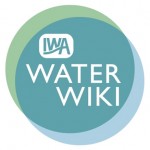 | The IWAWaterWiki is a website providing a space for water professionals to interact and share valuable water knowledge online. Offering articles on all areas of water, wastewater and environmental sciences the site aims to be THE online reference point for all areas of water. The site also provides a number of networking tools, allowing professionals from around the globe to communicate and interact online. Directed at water professionals, the IWA Water Wiki allows professionals to enter and share their own knowledge online, with a strong focus on water.
|
 | http://www.watersanitationhygiene.org/ Watersanitationhygiene.org is a site where anybody can share resources regarding water, sanitation and hygiene, plus also other themes such as disease vectors, waste, and enabling environment. The site hosts a very large collection of technical resources, and a very active discussion forum where one can post question or discuss issues with others. Complements the SSWM Toolbox with an active discussion forum, and by including further topics apart from water and sanitation.
|
 | http://www.waterservicesthatlast.org/ Water services that last is a resource for building sustainable rural water services. The website offers many tools with case studies from different countries. A systemic approach with the focus on learning for the future (and not just the fixing of problems) and an emphasis on the legacy of all projects are the main characteristics of Water services that last.
|
| https://washjournalists.wordpress.com/ WASH - JN is the network of West African WASH journalists. The network acts as key news and information platform for WASH related issues in Western Africa. |



